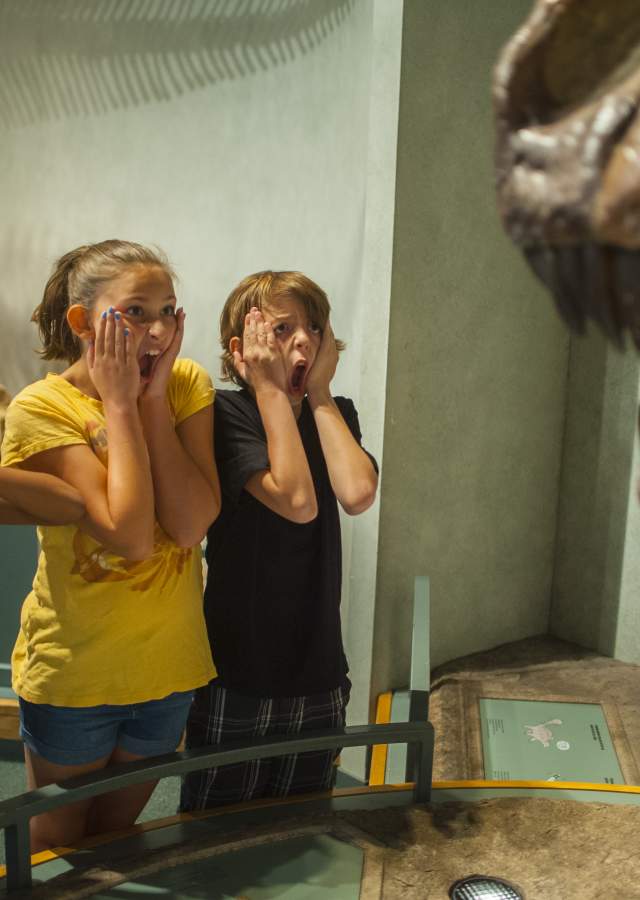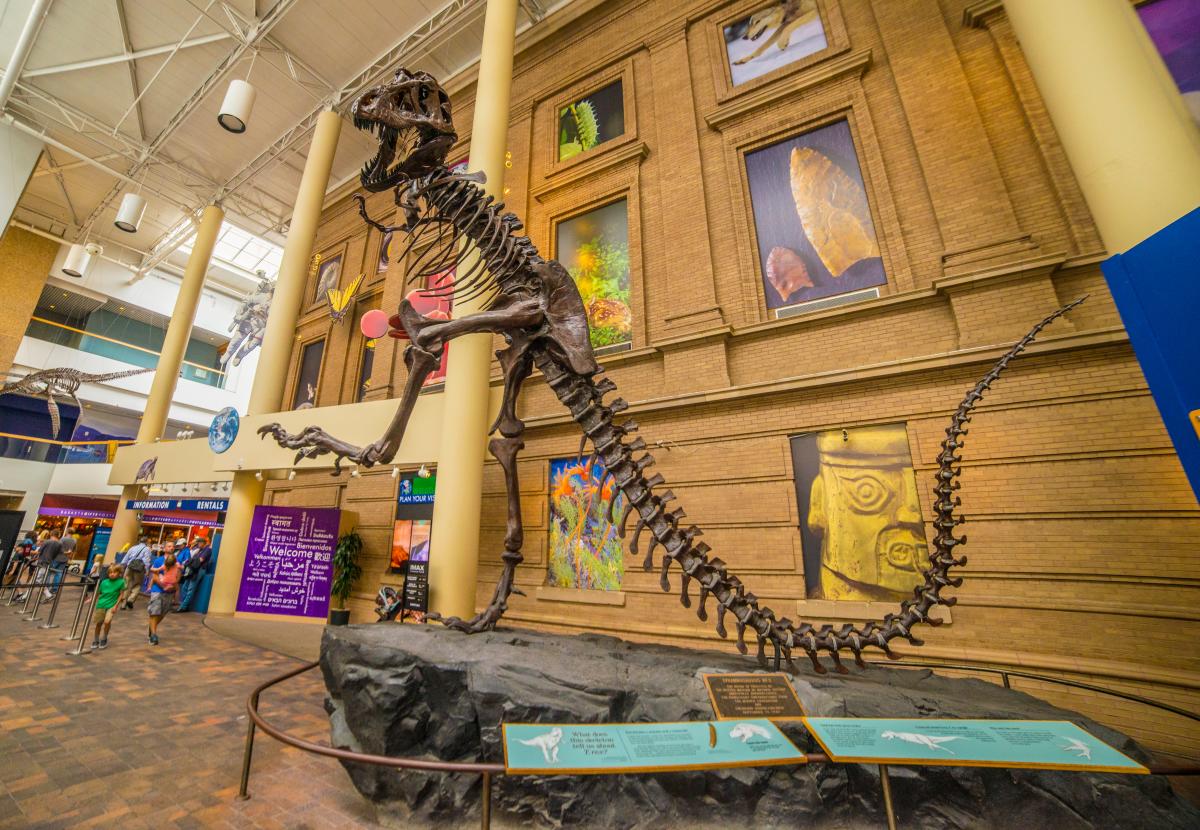
Your browser is not supported for this experience.
We recommend using Chrome, Firefox, Edge, or Safari.

If you love dinosaurs, Denver is the place to be. The city lies on some of the most fossil-rich land in the world, which means finding a piece of prehistoric history is as easy as walking your dog. Just ask a guy in Littleton—that’s how he found parts of a T. rex. Here’s a look at the Denver area’s dinosaurs.
DENVER MUSEUM OF NATURE & SCIENCE
One of the best places in Denver to find dinosaurs is the Denver Museum of Nature & Science, one of the premier natural history museums in the country. The Museum has close to 115,000 dinosaur, plant, and mammal fossils in its collections. You can visit the award-winning Prehistoric Journey exhibition, which features a Stegosaurus fossil discovered near Cañon City by a high school teacher, and an Allosaurus skeleton found by a 13-year-old girl in Moffat County.
DINOSAUR RIDGE
Dinosaur Ridge is a famous natural landmark, located along the Front Range of the Rocky Mountains, near Morrison, Colo. It features famous Jurassic dinosaur bones, such as Stegosaurus and Apatosaurus, discovered in 1877, and Cretaceous dinosaur footprints. A guidebook is available for use on self-guided tours. Guided tours can be arranged through the Friends of Dinosaur Ridge. Dinosaur Discovery Days are free outdoor events open to the public. They are held monthly (May through October) at Dinosaur Ridge on either the second or third Saturday of the month. Guides are stationed along the Dinosaur Ridge Trail at the most significant interpretive sites. Visitors hike at their own pace or take the Shuttle Bus (one way) at $4 per person (3 and under ride free). At the Visitor Center, Hands-on Dinos for kids includes the Backyard Bones Dinosaur Dig, the Cretaceous Crossroads Dinosaur Track Site, the Grallator Track Painting (paint a fossil and take it home), puppet shows performed by the Deep Time Players, and other activities depending on the theme for the day. The indoor exhibit, Trek Through Time, has free admission all day. The shuttle buses operate continuously between the East Gate and the Dinosaur Bone Site (see map of locations) during the event. The Shuttle Bus Tour resumes its normal schedule between the Visitor Center and the Dinosaur Bone Site after 3 p.m.
Denver Museum of Nature & Science
TRICERATOPS TRAIL AT PARFET PREHISTORIC RESERVE
1301 19th St., Golden
Stand exactly where a dinosaur stood 68 million years before you! This half-mile hiking trail is full of trace fossils, which are the footprints and marks made by animals walking or crawling. To get to the trail, park in the lot west of the Ford dealership on 19th Street, just east of U.S. Highway 6 in Golden, then take the bike path west and follow the trail south for about a quarter-mile.
RED ROCKS PARK & AMPHITHEATRE
A picture-perfect setting with flawless all-natural acoustics, Red Rocks Park & Amphitheatre is a Colorado original. While it may be known first and foremost as a music venue, Red Rocks also has a prehistoric connection. In 1877, Stegosaurus, the Colorado state fossil, was found near Morrison, Colorado, which is the home of Red Rocks, while nearby dinosaur tracks also tell of the Jurassic Period. Also, fossil fragments of the giant 40-foot plesiosaur, the marine reptile mossaur, and flying reptiles captivate both students and scientists. Red Rocks Amphitheatre is located in the 816-acre Red Rocks Park, which is open to visitors daily from 5 a.m. to 11 p.m. On event days, tourists can visit the park until 5 p.m.
FOSSIL TRACE GOLF CLUB
3050 Illinois St., Golden
Owned by the City of Golden, Fossil Trace Golf Club is not only a great place to get in a challenging round, but also a unique way to spot prehistoric history. Triceratops footprints, as well as other fossils, can be seen adjacent to the 12th green. Also, inside the main doors of the clubhouse, there is an exhibit that gives information about the tracks and fossils uncovered on the site. For the non-golfing crowd, the footprints can be accessed at the corner of 6th Avenue and 19th Street.
COORS FIELD
There's a story behind everything — including the mascot for the Colorado Rockies. In 1994, construction crews turned up an unidentifiable rib fragment of a dinosaur near home plate during excavation for Coors Field. The discovery led to the invention of the world's second purple dinosaur, Dinger, the beloved mascot for the Rockies.
DENVER TROLLEY
On the Denver Trolley, enjoy a trip back in time — one that could be further than you expected. Lakewood Gulch, which is part of the Platte Valley Trolley route, is also home to the site of the first Triceratops fossil ever found. In 1887 it was misidentified as an extinct bison, but it was later discovered to be the horns of one of the world's most popular dinosaurs. The trolley runs Friday, Saturday, and Sunday from early spring to around Oct. 31. Tickets are $3 for adults and $2 for children. Pickup is right next to the REI Flagship Store.
COORS BREWERY
How about a cold one (or three)? And while you're enjoying those frosty beverages, take a look out the window of Coors Brewery and you'll see the spot where parts of a Triceratops skeleton were excavated on North Table Mountain. Coors provides self guided tours for guests 21+ with a valid ID.
MORRISON NATURAL HISTORY MUSEUM
501 Colorado 8, Morrison
Get a glimpse of early dinosaur discoveries from Colorado, including fossils from the first Stegosaurus and Apatosaurus ever found. Located 25 minutes west of Downtown Denver, the 3,000-square-foot exhibition offers a relaxed environment that is perfect for kids of all ages to explore rocks and fossils. The exhibits and guides connect visitors with the ancient story of the Front Range. Recent local excavations have yielded famous baby dinosaur footprints that were featured in Smithsonian magazine and media outlets around the world.
UNIVERSITY OF COLORADO MUSEUM OF NATURAL HISTORY
1035 Broadway, Boulder
The CU Museum of Natural History is just another way the state embraces its fossil-rich land. This museum boasts a collection of about 95,000 cataloged fossil specimens gathered from around the world. Visitors can check out the paleontology hall as well as the exhibit Fossils: Clues to the Past, which features fossils from the Rocky Mountain Region. The museum is open seven days a week, but closed on major university holidays. Admission is free, and donations are accepted.
Denver Itinerary: 3 Days
Get ready to shop, take in the sights and see the best of Denver with our three-day itinerary.
Regional Itineraries
As home to Denver International Airport, The Mile High City is the perfect place to kick-off any Colorado and beyond trip. Get some ideas on how you…
Colorado and Utah - Denver to Denver
11 nights Denver to Denver Route: Denver, CO (2) - Glenwood Springs, CO - Gateway, CO, - Moab, UT - Mesa Verde, CO - Durango, CO - Colorado…
Colorado Circle - Denver to Denver
8 nights Denver to Denver Route: Denver, CO (2) – Grand Lake or Estes Park, CO - Grand Junction, CO (2) - Durango, CO (2) – Denver,...
Mountains to Canyons - Denver to Las Vegas
14 nights Denver to Las Vegas Route: Denver, CO (2) – Grand Lake , CO – Grand Junction, CO (2) – Moab, UT(2) – Torrey, UT…
Real American West - Denver to Denver
14 nights Denver to Denver Route (Yellowstone Park): Denver, CO (2) - Cheyenne, WY - Rapid City, SD (2) - Cody, WY - Yellowstone National Park…
Day Trips
Whether you have a few hours, a few days or a week in The Mile High City, here are some suggested itineraries and trips for visitors.
A Weekend Full of Family Fun in Denver
The Mile High City is an amazing destination for kids. In addition to the world-class Denver Zoo and Denver Museum of Nature & Science, there are…
A Weekend in Denver
There’s a lot to do in Denver, but three days gives you plenty of time to take in much of what the city has to offer without feeling like…
Beer Walking Tour: LoDo to LoHi
It is estimated that more than 200 different beers are brewed in Denver every single day, giving The Mile High City its claim as the “Napa…
Business Traveler's Itinerary
If you’re in town for a convention or business meeting, chances are good that your free time is going to extremely limited – there are…
Denver Art in One Day
Denver's art world is booming, and thanks to the city's walkability, visitors can experience some of the best artsy attractions on foot in a…
Denver LGBT: 3-Day Weekend
Denver has the most vibrant LGBTQ+ scene in the Rockies, with citywide annual events and a busy club scene. The Mile High City is also home to one of…
Denver's Beat Legacy
More than half a century after the publication of Jack Kerouac's era-defining novel, On The Road, was published, the taboo-shattering exploits of…
Denver's Best Photo Opportunities
With 300 days of sunshine and a skyline framed by the spectacular Rocky Mountains, it's no wonder that Denver has attracted a wide array of…
Downtown Denver
Lower Downtown Denver (LoDo) is hot. The neighborhood has been completely restored and renovated over the years, making LoDo one of the liveliest…
Free Activities
You don’t have to break the bank to have a great time in Denver. Throughout the city, there are countless attractions and activities that will…
Free Denver Tours
For the budget-minded, Denver is the perfect spot for an affordable vacation getaway. These free tours take you behind the scenes at several unique…
Girlfriend's Getaway
Get away with the girls! From spas to shopping, from dining to dancing, Denver has everything you need for an unforgettable girlfriend getaway…
Golden Triangle/Colfax
Stimulating cultural attractions, appealing green space, countless restaurants and a hopping nightlife are all within walking distance when you begin…
Hidden Gems in Denver
Beyond the big-ticket attractions, Denver is home to a wide array of smaller, but no-less-fascinating attractions that make for unforgettable…
High-Altitude Experiences In Denver
Get a mile high (and much higher) in The Mile High City. From chic lounges located above downtown to the highest paved auto road in North America…
Highlands
Spend a day in the Highlands, one of Denver’s great neighborhoods, just a few minutes northwest of downtown. This community, which has…
Historic Downtown Walking Tour
This walking tour will take you to some of the best spots in downtown Denver, where the city’s past and present come together in utterly unique…
Off-Beat Denver Tours
See Denver through a different lens! These guided tours offer VIP access to some of The Mile High City’s greatest hidden gems. Find out how…
Public Art Walking Tour
Great art isn’t just in museums in Denver. All over the city, you’ll find gorgeous murals, whimsical sculptures and other kinds of public…
Rock 'n' Roll Experiences in Denver
Looking to rock out in The Mile High City? Here's a look at some of your options. Air guitar is encouraged.
Ten Romantic Mile High City Spots
During the summer months, there's no better spot to snuggle than under the stars at Denver Botanic Gardens, a blooming botanical paradise in which…




































